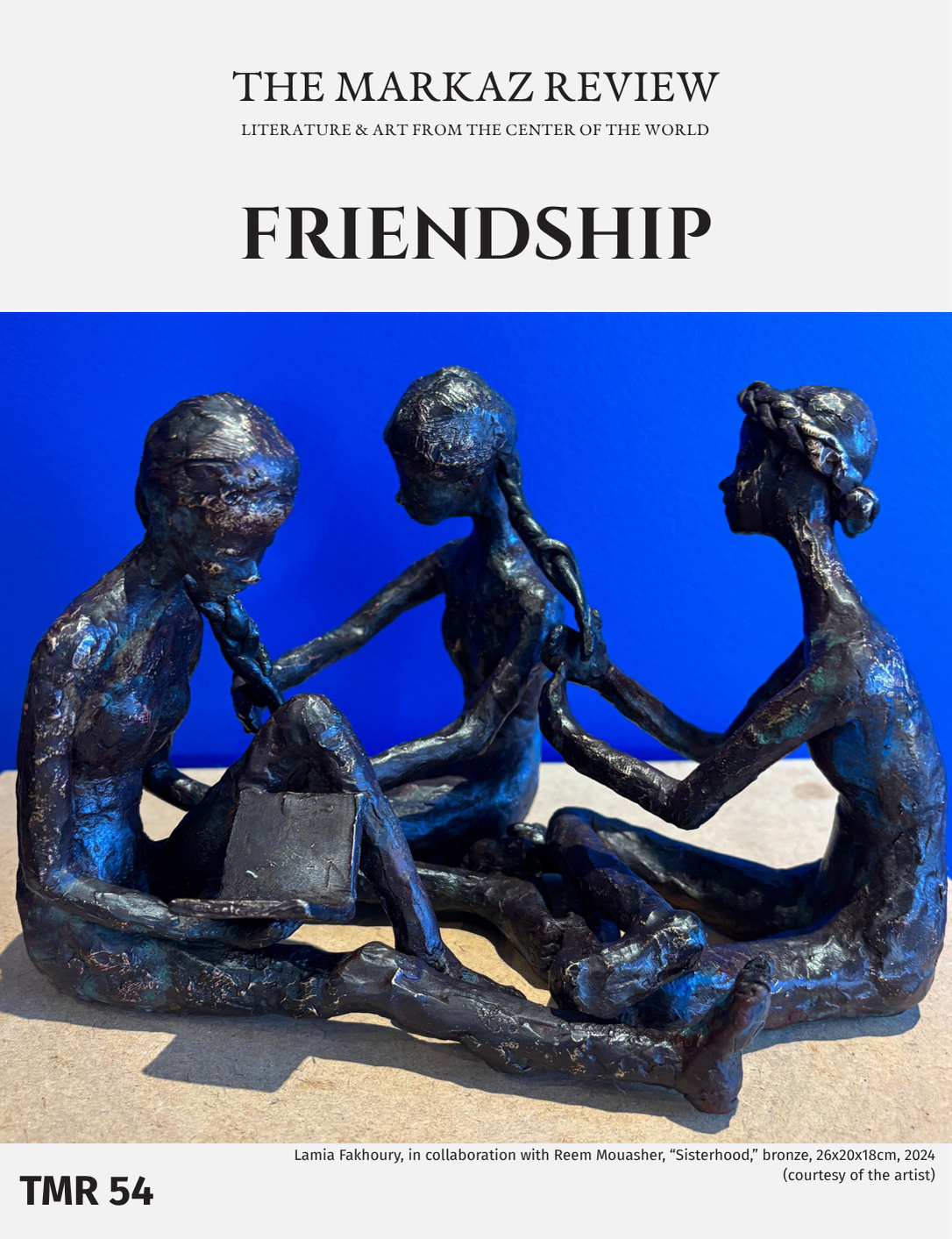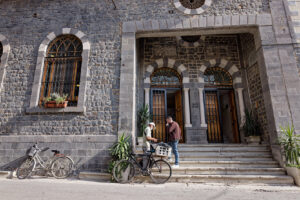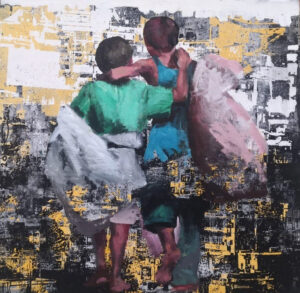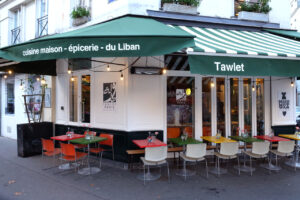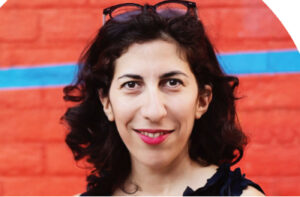The manners and mores of hierarchical, class-obsessed Lebanese bourgeois bear more than a passing resemblance to Jane Austen’s England. Two men who knew each other in childhood cross paths; old and new resentments flare.
It was always a curious sight when a young Lebanese man of good standing and good fortune had not yet taken a wife. No one seemed to draw more attention in this regard than one Elias Bannout, who could not escape the fervor surrounding securing a respectable wife. Like many of his generation, he was reminded time and again of how important it was that he start a family of his own to carry on his father’s enterprise that imported electronics from the Far East. Everyone had chalked his flagrant disinterest up to the changes of the 1970s, because there was no other reason someone so tall, dark, and handsome would have no interest in women. No one was as concerned with this prospect as Monsieur and Madame Bannout, who were keen to remind him of the predicament whenever the matter seemed pertinent to them—and it seemingly always did.
Elias had returned to Rabbieh for his father’s annual party, hosted to indulge his business associates, and had even agreed to wear a white tuxedo for the occasion in the vein of his father’s favorite spy. Monsieur and Madame Bannout were naturally older than he’d remembered but much older than he expected them to appear at that age after only a couple of years of having been away. William, who, even as an artist, tried to fight his fixation with aesthetics, couldn’t help but inspect the wrinkles that had crinkled their faces, or the silver hairs that once were dyed over but now left there. It was as if his parents had reached a point in their lives where there was no point in hiding the ravages of time—time and Lebanon, considering the precarious political situation that seemed to perpetually promise another civil war, this even worse than the one that had happened in the mountain a little over a hundred years ago. Really, it was no surprise, then, that the elders had succumbed to stress as the youth had fled the country left and right, promising never to return. Monsieur Bannout now required the assistance of a cane, and Madame Bannout, who’d always been heavier than the average Lebanese woman her age, had put on more weight. Elias and his sister Jana had been the spitting images of them when they were younger, making it all the more discomforting to sit before them and be lectured on their futures in this country now. Jana was expected to have had children by now and Elias was supposed to start taking the reins of the family business by endearing himself to his future network after his interlude as an artist in Beirut was put to rest.
“….did you hear that her son has gotten married?” Madame Bannout raised the subject on a whim as she tended to the villa’s veranda over Turkish coffee. Forgoing the help, she had prepared it herself for this special happenstance, but had forgotten how to pull it off properly with the lack of practice. The picturesque hills of Mount Lebanon surrounded them, opening up to the peaceful azure sky. Though Elias was relieved to be rid of Beirut’s endless sprawls, he felt in Rabieh as if he were suspended in place with nowhere to run. He chose not to respond, only nodding pleasantly.
“Oh my, how time passes,” she continued. “Tell us about what’s been happening with you, love.” As Elias feared whenever he’d left Hamra, this family gathering had encouraged the rote routines of Lebanese traditional life that he’d spent his entire adulthood hoping to escape. “Are there any special women in your life?”
“Yes, mama.” Elias smiled curtly, trying to conceal his exasperation with the subject. “You.”
Monsieur and Madame Bannout were visibly peeved, and Jana broke into hysterical laughter, adding to their chagrin.
“Oh, leave the poor boy alone.” Jana turned to their parents with her commanding presence. In the intervening years, she had matured into a headstrong woman with far more personality and force of will than Elias could ever match. It was complimented by her sturdy frame and choice of dress, which covered her in shawls as if she were a grand dame from a faraway land. “We’ll find out when he wants us to.”
“Gentlemen aren’t supposed to kiss and tell,” Elias reminded them. “It’s no one’s business but my own.”
“Depends on who that gentleman is kissing,” Jana replied with a Cheshire grin. “Are you still seeing that girl from Hamra?”
“Oh, which girl?” Madame Bannout lit up. “From what family? Did she relocate there for university, I hope?”
Elias shot her a glare before replying innocuously: “That girl has long gone.”
“It seems they all have,” Jana teased.
“You need to expand your social circle.” Monsieur Bannout sighed. “You’re spending too much time in West Beirut with these new friends. It’s as if you don’t know what you want anymore. Where is that driven young man who was ready to write the Great Lebanese Novel only a couple of years ago? All I see you do now is bounce around from one article to the next while holding a position that is beneath your talent.”
“I’ll try harder, papa.” Elias rolled his eyes. “It would be much easier to expand my social circle if I could leave the country to continue my education.”
“None of that nonsense, Elias.” Monsieur Bannout sighed. “Couldn’t you just be satisfied staying with us now that you’ll take over the family business? You’ve had your fun, but we can’t let you run around Hamra forever now that college is over.”
“Oh,” Madame Bannout intervened, trying to ease the situation. “William from the Darsi family is staying with us over the weekend so he can photograph the event. Perhaps he can introduce you to his friends and family in Achrafieh. You and Jana remember him, right?”
“The mischievous daredevil we used to be left alone with when his father visited?” Jana responded with unusual interest. “I remember him well. Is he still as handsome as he used to be? And single…”
Elias on the other hand was displeased. From competitive badge-collecting in the local branch of the Lebanese Scouting Federation to their paint-offs in the art and craft school in Hamra, memories of a youth spent with William Darsi were unpleasant to say the least, and this time, of all times, was not one where he wished to have him brought back in his life.
“Easy there,” Madame Bannout chuckled. “It’s unfortunate, but in the intervening years his mother has passed away, and, being raised by that aunt of his, I hear he’s developed an attitude.”
“Probably developed it from having to deal with her all these years,” Jana replied with uncharacteristic disdain. “For the life of me, I can’t recall an instant where I’ve seen her smile.”
“Oh, we won’t have to worry about that.” Madame Bannout sighed. “Sitt El Bourji shan’t stay long.”
“So is he coming to stay?” Elias asked, worried. “You know me and him always had a…contentious relationship.”
“Speaking of which,” Monsieur Bannout interrupted the conversation by raising his voice. “William should be here any minute now, and we should be polite to our guest.”
“You mean, we should be polite to our guest whose father’s connections we rely on for our livelihood,” Elias whispered to his mother and sister, who laughed.
“—Ah, there he is at the entrance! Both of them, actually!” Monsieur Bannout playfully brushed his hand on Elias’ face to quiet him while trying to hold back laughter. “Now, please be nice. I know he’s a bit much to handle, and his aunt told me his attitude has become only more overbearing over the years. Not that her’s has improved. Anyhow, tag along with me Elias. From now on, we greet guests together so that you can get the hang of it.”
“Righto…”
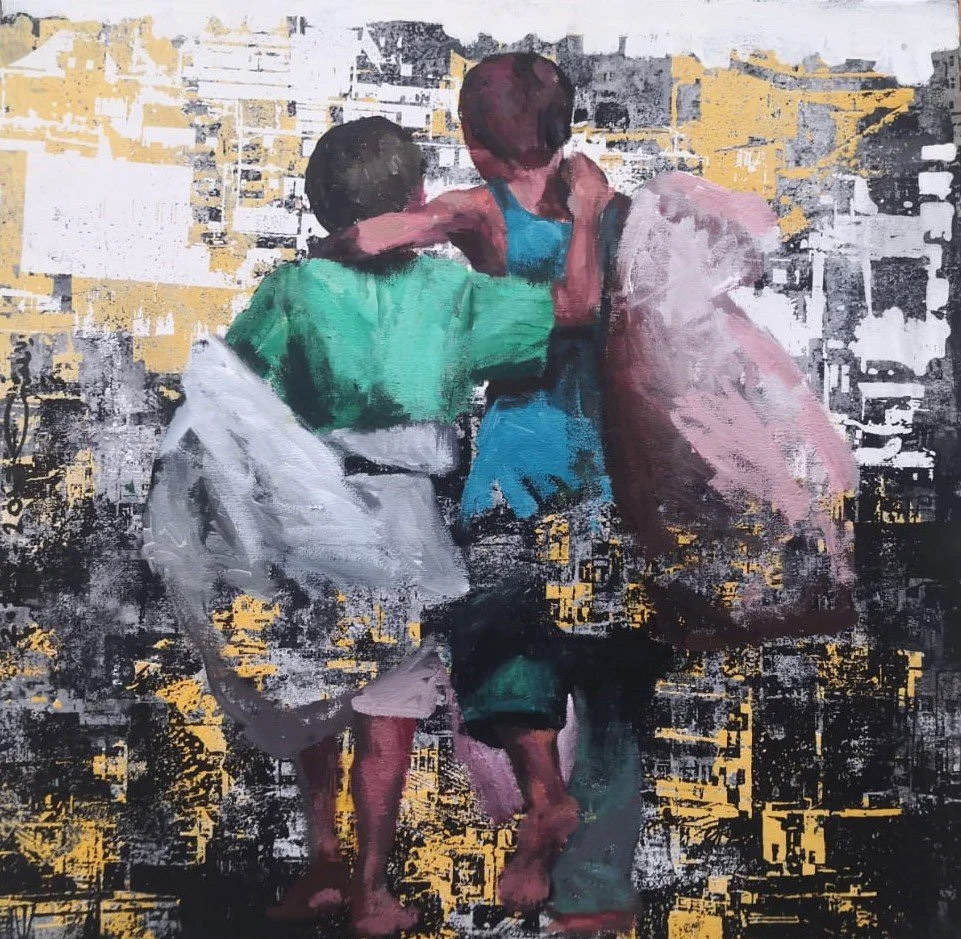
William Darsi was, as always, dressed to impress in a mix of Parisian high fashion and East Beirut’s refined sensibilities. The feminine cut of his beige trench coat accentuated his svelte physique. Besides the designer shoes and red beret he had on, it was the only article of clothing visible as it was oversized and tied up in an intricate knot. With his statuesque features, he came off more like an image one would find on a billboard or in a magazine than a real person. Naturally, Jana was delighted, and William had to hide his interest, as surrounded by family as he was. Accompanying him was Sitt El Bourji, who looked as if she had crossed paths with him by accident and was trying to avoid being seen with him. Even though she was as old as Monsieur and Madame Bannout, she’d refused to update her attire and attitude for the times. Garbed in a tailored bordeaux dress with a cinched waist and suffocating neckline, there was no opulence on display, but it was clear to anyone that she came from a lineage that predated the fall of Constantinople.
“Is this a permanent residence, or are you just renting for the summer?” Sitt El Bourji carefully studied the entrance hall with contempt for its modernist sensibilities.
Taken back, Monsieur Bannout wasn’t sure how to respond.
“Stylistically, this is what’s in vogue now,” Elias chimed in the awkward silence. “Unfortunately, this villa is more of a financial investment on our part than anything concerned with proper presentation.”
“It seems you can’t have both these days,” Sitt El Bourji muttered, seemingly to herself.
Desperately trying to change the subject, Monsieur Bannout reached out with his hand:
“It’s always a pleasure.” He kissed each of her cheeks. “I’m sure you remember my son, Elias.”
William, who up to till now was slowly running his fingers through the hanging macaramés with bewilderment, lit up with intrigue.
“Of course!” He chuckled. “I didn’t recognize him, at first. You seem so…different. I can’t wait ‘till we pick up where we left off.”
“Can’t wait.” Elias shifted uncomfortably, trying to find an excuse to leave. “Sitt El Bourji, would you like me to escort you back to your chauffeur?”
Wising up to what his son was up to, Monsieur Bannout intervened with a smirk:
“And on your way, you could show off some of our latest pop art installations. I’m sure that Sitt El Bourji would love that Roy Lichenstein piece we picked up at that exhibit in New York.”
Sitt El Bourji was having none of it and stormed off, cursing in French.
Monsieur Bannout escorted William Darsi inside and introduced him as the son of a notable politician, impressing upon his family the importance of their work together. Jana rose to shake William’s hand, only for William to awkwardly receive it. There seemed to be a reticence toward what William had encountered here in the Banout household, and it was easy to recognize his aversion to the nouveau riche. Elias had encountered the attitude many-a-time in East Beirut before relocating to the Western side.
“It’s a lovely villa you’ve purchased,” Darsi said, inspecting the neighborhood from the railing. “You must be proud of how far you’ve come, Monsieur Bannout. Not many can make something of themselves in this country, especially these days with all the riff raff causing trouble. ”
“Ah, thank you.” Monsieur Bannout shifted uncomfortably in his chair. “We wanted to reintroduce you to our children, Elias and Jana. We think you will find that you have much in common now. Elias fancies himself an artist, too—a writer to be more specific—although it’s more of a hobby.”
“A hobby I went to university for, it seems.” Elias rolled his eyes.
“Well,” William smiled, “we all experiment in college.”
It was another one of those picturesque mornings in Rabieh that was uncanny in its perfections. As the warm sun rose gently over the horizon it cast rays of soft light that when filtered through the lush greenery painted life in Lebanon with a ethereal sheen. From the terrace, Elias studied his surroundings after a difficult night then jotted down the first thoughts that came to him. Journal in hand, he then strolled down to the pool to find Jana on a beach chair in sunglasses pretending not to be ogling William as he swam laps in his Italian speedos. Even with the tensions between them, the roughness of their relations had smoothed over in the short period since he’d arrived here, and it was as if he and William had fallen back into their routine as children before their rivalries had taken precedence. Even when dealing with a problem as difficult as William Darsi, life removed from the dramas that suffocated Beirut, was far simpler than he could ever be comfortable in accepting. Perplexed by this notion, Elias joined in the chair next to her, refocusing on his writing, or at least trying to…
Even though he preferred fiction, he found he could only write short poems in Rabieh. It was the only way to capture a mood more accurately in a few pen strokes. Not that it would have gotten him far elsewhere, but there was no future in poetry here, and the program he’d been accepted to was the closest path out of Beirut and into the literary establishment he could find for someone from Lebanon.
“What are you jotting down?” William called out from the pool when he noticed Elias in his chair.
“Oh, when Elias writes, he doesn’t like to be disturbed,” Jana replied for her brother. “Let’s leave him be. Artistes don’t like to be disturbed.”
“Yes.” Elias laughed. “Leave me be to write my miserable poetry.”
“Misery loves company.” William laughed and exited the pool. “Let us hear it then.”
Usually, Elias wasn’t keen on sharing his writing with anyone, but he felt he had to share it with someone at this point. The feeling of malaise had been bringing down his mood ever since he’d left Beirut and he didn’t feel like he could share it with anyone. Studying what he had scribbled down, he knew it wasn’t much, but he wanted someone to hear it.
“If you insist, I’ll serenade you with my pretentious fancy. Mind you, I just wrote down how I was feeling.”
“Let’s hear it then.” William lifted himself out of the pool, his statuesque physique glistening in the afternoon sun. Taking the beach chair by Jana, he dried himself off with a smile and sat back comfortably—too comfortably—with forced anticipation, so that Elias couldn’t tell if he was being mocked. “I’m ready to be moved.”
Elias hesitated so Jana, much to his shock, snatched the journal out of his hand and started to read:
“Alright, it’s called A Life I Have Not Lived by Elias Bannout:
I remember a life I have not lived
for I am not who I am,
nor who I want to be
and all I have left now are memories
and all I leave behind is a dream…”
“Gosh,” Jana murmured in disbelief. She turned to her brother with a worried look, but he avoided her gaze. William began a slow, thundering clap.
“Loved it. I think you chose an utterly miserable narrator, but I can see how you got into a foreign program. You’ve got talent, Elias.”
Elias was speechless. This was probably the only thing William had said since they were introduced that wasn’t dripping with sarcasm. He didn’t know how to feel about it, but it did make him feel better.
“Do you write, William?” Jana carried on the conversation.
“As a matter of fact,” William put on his sunglasses. “I’ve got a way with words, too.”
“Then, share it with us.”
“Nothing’s coming to me at the moment.” He stared out over the railing at the hills of Rabieh. “I’m not sure why.”
It was the awaited night. Monsieur Bannout’s gathering was an uneasy mix of the nouveau riche lacking in self-awareness, and the scions of the feudal families who were all too aware of who they were dealing with. In line with the decade’s ethos, Madame Bannout’s attempts to appear modern to attendees were more tacky than regal. From the fondue fountain to the American cover band, an overwhelming sense of desperation had manifested as envy of the old money scions, who wished they could still afford to throw that kind of money away.
Elias hung back in the periphery with Jana, watching the events unfold without much thought on the whole affair. Usually, he couldn’t wait to head back down to Hamra to continue the bohemian lifestyle he had grown accustomed to, but university was finally over, and he had lost interest in the pretentiousness of the scene long before that. Across the room, William took photographs of the guests, and Elias couldn’t help but think he was somehow mocking them.
“I think he’s handsome, too.” Jana winked. “Too bad about his personality.”
“Ironically, it’s not different from any of the others we know in our circles, even if he is from the other side,” Elias responded, “but he seems particularly self-satisfied with his presumptions.”
“Here he comes, so be nice,” Jana reminded him. “Papa wants to be in his father’s graces even though his father wouldn’t even attend this event.”
William walked over with a smirk and a snark:
“You seem to be enjoying this party just as much as I am.”
“Well, we can make our own fun, William,” Jana clapped back. “Care to dance?”
For the first time since meeting him, William seemed uneasy.
“Uh, I think I’ll have to pass on that tempting offer,” he said, lifting his camera. It’s best if I focus on taking photographs at the moment.”
Resilient as she was, Elias could tell Jana felt slighted by the rejection, but she chose not to express it.
“I’ll leave you two at it then.” She held her head high and strutted off. “I think I’ll dance on my own.”
Even though their banter implied otherwise, it was clear that his sister was disheartened by the rejection, and Elias was not happy about that one bit. Neither one believed William’s excuse, which finally soured Elias again on the man, snark or not. Still, William seemed particularly interested in Elias, even though Elias couldn’t hide his discomfort.
“So, what’s it like being an artist in West Beirut?” he asked.
“Kind of like being turned down by you.”
“Oh, temper.” William latched onto his shoulder. “It was nothing personal. I just wasn’t interested, if you catch my drift.”
“I don’t, and, well, I’m not interested in continuing this conversation.” Elias turned toward the exit, letting William’s hand fall off. “It’s nothing personal, but I’ve had it with Lebanese people these days.”
“Believe me, I know how it feels.” He gulped his drink. “I sometimes just want to get on the first plane out of here and start a life elsewhere.”
“I’m not too far off. I was planning on that before my father stopped me. I don’t think I can stomach more of this place”—he turned back to William with disdain—“or its people.”
Madame Bannout called out to Elias from across the hall. Elias rushed over with William close behind.
“It’s your father; he’s feeling ill. I’m unsure what’s wrong, but we should take him to the American University Hospital in Beirut for a checkup after the party.”
“I can’t drive.” Elias panicked.
“It’s alright,” William said. “I’ll drive you two down.”
Even though Monsieur Bannout was in the backseat of a vintage Aston Martin DB5, his dream car, he was far too caught up in his discomfort for Elias’ own. Having to share the front seat with William in an intoxicated state did not ameliorate the situation. Still, the fine leather and plush carpeting helped.
“Forgive the disagreeable driving.” William tried to ease their concerns. “It’s night, and there are no street lights, and I’m a bit tipsy, but we should be alright.”
“Thank you, William. I wish we didn’t have to bother you with this, but Elias seems to have skipped the driving lessons we had purchased.”
“Papa, where I’m going, I won’t need to know how to drive.”
“Your sister can drive.”
“Then let her take over the company.”
Monsieur Bannout was speechless. Elias turned his face to the window, staring at the night sky. Trying to ease the situation, William changed the subject.
“My father would’ve loved the party.”
“Would he now?”
“Of course.” William and Elias smirked. “I’ll urge him to join us next time. You two will have a lot to discuss. I wanted to thank you for hiring me; it’s tough to find work with the economy being what it is now, and I could always use the practice. My father greatly appreciates it.”
“Oh, nonsense. I sifted through your portfolio, and it was lovely. You’re an artist. You know, Elias here is a writer, as I mentioned before.”
“Copywriter,” Elias corrected. “I was the one behind the jingle for the ‘Ooh là là!’ ad.”
“‘Indulge in the elegance and charm of French sophistication with every bite of Ooh là là!’” William whispered with glee. “‘An authentic European experience.’ You are an artiste.”
The discussion with the doctor occurred as an out-of-body experience. In the back of his mind, Elias had always known something like this would happen, considering his father’s age, but it couldn’t have happened at a worse time. The last thing he needed was a reminder of the family’s fragile position if the worst came to pass. Elias walked into the reception area and was surprised to see William still there.
“How is he?” William rushed over.
“So, the doctor tells me he’ll be fine.” Elias sighed in relief. “It was just a stress reaction. He’ll spend the night with them so they can monitor his condition, and we’ll head back up tomorrow. Do you know any hotels I can stay at tonight?”
“Nonsense, you’ll spend the night at my place. I have an apartment in Achrafieh.”
“Are you sure?”
“It’ll be fun, but first…”
“First?”
“First, the evening is about to end, and the discos are about to open.”
Once the velvet curtains were drawn back, neon lights painted the walls in hypnotic patterns, and the discotheque pulsed to the rhythm of the groove. The dance floor was a sprawling expanse of polished black tiles that shimmered under the kaleidoscopic lights. The lone DJ was perched behind a fortress of turntables, intermixing the rhythm and bass, letting the music surge throughout the partiers’ bodies as they danced under the disco ball that scattered shards of light across the room.
Lebanese youth were dressed in the latest fashions imported from Europe and America. Elias and William, like the other men, were dressed in sleek, high-collared suits that exhibited their rugged chests, while women in sequined dresses caught the light with every movement. The air was tinged with the mingling scents of expensive perfumes, cocktails, and cigarettes. It was intoxicating.
William danced in the center, taking on as many partners as he could as girls nudged each other to try and share the spotlight. Elias watched from a distance, dancing by himself, trying to get into the beat. Once William caught sight of him alone, he moved in and shared the space.
“William, what are you doing? This is not the place for this kind of thing.”
“Relax, it’s the 70s. Just lighten up. No one cares like they used to, and you could use someone to dance with.”
Elias took him by the hand and walked out with him.
“Let’s just head out.” He panicked. “What if someone recognizes me? I don’t want people to start talking.”
“Alright,” William nodded as they stood outside under the neon sign in the dark. “Where do you want to go?”
“Let’s head down the hill from here. I want to walk by the sea in Raouche. I haven’t had the chance to since I moved back in with my parents. It’s where I go to calm myself down.”
“Après Vous.”
Raouche, at night, was as melancholy as ever. The stars in the sky lit the Corniche Beirut with faint flickers. In comparison, the lamps that lit the path by the railing cast a charged glow onto Elias and William as they strolled along. The Mediterranean Sea was to their left, and its uncharacteristic stillness left the Avenue de Paris uncomfortably quiet. For the first time since he’d met William, no one else was around, and Elias was distinctly aware that they were alone. And yet, he felt exposed, as he always had, around William, who seemed to take on a different affect when speaking to Elias.
“You know, despite our history, I’ve taken a renewed liking to you in the time we’ve recently spent together,” William blurted out of the blue. It had been a half-hour since they’d walked down to one end, and they were half through the sidewalk by the time William dared to break the silence. “It’s rare that I find others in our circles I can tolerate.”
“That’s an interesting development,” Elias replied. “I’m surprised you would consider me a member of the circles you associate with.”
“You could say that, since I don’t usually take a liking to your kind,” William teased. “But Lebanese money is like all other Lebanese money, no matter when that fortune was accumulated. I don’t particularly favor my background over yours. Besides, a rough charm to the nouveau riche is lost with each successive generation of wealth. It’s as endearing as those American films that have grown on me now that I’m bored with French cinema.”
“High praise. I’m honored, sheikh.”
“Honor’s all mine.” William chuckled. “Can I read some more of your writing?”
“Why?” A feeling of discomfort came over Elias, as if he was being mocked.
“Just curious.” William winked. “Wondering if you were one of those artists like moi.”
Elias hated sharing his art with other people, especially his fiction. In poetry, he could hide within the abstract, but in prose, his inner self, in all its insecurities, was fleshed out in painful detail. If he struggled to share it with his sister, then he knew that sharing it with William would be impossible. Even then, it was hard to tell what William’s motives for it were.
“I’m not an artist.” Elias struggled to get the words out. “I’m not particularly interesting.”
“Oh.” William leaned in for a kiss. “I think you’re fascinating.”
Elias backed away. He’d wanted this since they’d first met again, but something wasn’t right.
“We should go back,” he stuttered. “I’ll stay by my dad’s side for the night. Can you drop me off?”
“I was just joking about the artiste thing. Don’t let that bother you. I’m like that with everybody.”
“I know, William,” Elias managed to say with difficulty. “And I wish you weren’t.”
“But…”
“Let’s head back.”
It had been months since he’d heard from William. Elias was sitting on the roof when he’d received the letter. Jana had snuck it in for him from Beirut, and all she knew was that it was from William. Elias had tried for the last couple of months not to think about him, but with the letter on the stand right in front of him, he was tempted to look. After all, it was encased in textured stationery with a wax seal decorated with an intricate design. Holding it closer, he took in the delicate waft of bygone elegance. William had gone through the effort of writing it, and it was only polite to take a peek.
“Elias, mon amour, I sit in my studio and can’t seem to draw a single brushstroke that doesn’t reflect on our time together. I’ve wanted to reach out for weeks, but since your medium is the pen, I realized that I should try and communicate with you in a way that shows my respect and admiration, something I regretfully made no attempt to when we were getting to know each other. This persona I’ve maintained over the years was to drive people away because I can’t stand Lebanon and all its phoniness. Still, I always held out hope I would meet a fellow artist I could connect with while stuck here. But, it seems I waited so long that I forgot who I really was and committed to my act, driving away the only person I could have some connection with. All I am trying to say is, if I were to remember a life I have not lived with you, then it would be a life I have not lived at all.”
No doubt, the letter was penned with a careful hand.
William had been right about one thing. He also had a way with words.
Elias walked past the latest residential buildings in Beirut to an old estate in Achrafieh. Having friends all over the area, he had passed such modernist structures multiple times, always wondering what kind of people lived there. Under his elbow, was tucked a gift his mother had insisted he deliver for all the trouble his father caused.
Expecting William, a servant answered the door and escorted him to the salon, where Sitt El Bourji sat staring out the window despondently. In her own residence, she seemed dressed to impress, even though no one was around.
“Are you one of Williams… friends?” She sighed.
“Yes,” Elias replied uncomfortably, realizing she didn’t even remember him.
The woman turned from the window to take a look at Elias before returning her attention to the window. It was clear from his atypical attire, Greenwich village by way of West Beirut, that she didn’t think much of him or his style.
“Uncharacteristically charitable of William,” she finally said. “I was always under the impression that he would only associate with certain characters from East Beirut—ones cut from the same cloth as he is, or was, I guess.”
“Seems like he’s full of surprises,” Elias retorted.
“And what is that you’ve got there?”
“It’s a gift I’ve brought him as a thank you for helping my father.”
Elias presented the handcrafted journal he had sown together with copies of his poems and short stories.
“It’s… cute.” The woman returned it to him. “Folksy.”
“I think William will like it,” Elias affirmed.
“Then you don’t know William,” she replied dispassionately.
“Who knows? He might surprise you.”
“I wouldn’t count on that, dear. Really, no matter what happens in this country, nothing and no one ever seems to change.”
Elias could hear a door close behind him.
“Auntie, have you not lef the house today? Wait…is anyone here?” William walked into the salon. “Oh, Elias!”
Elias paced towards the door.
“Sorry, I have to go.”
The night was serene, like it was when they walked Rawche the first time. Cool air had Elias tugging at his coat as he walked by the seaside. Just when Elias thought he could be alone, he heard the light footsteps of designer shoes. Of course, William had tracked him down, and, more than anything, he was hoping he would.
“So why the change of heart?” William asked. “To be honest Elias, I thought you would just chuck the letter away.”
“I’m not sure,” was all Elias had to say. “I wanted to give this a shot, but then I got…Oh, I don’t know anymore.”
“Well, I know, and I think you should still leave for the PhD.” William suddenly paused, and there was an uncharacteristic genuineness to him.
“Oh,” Elias sighed, disappointed. “I thought. Maybe—”
“And I want to come with you.”
Without another word, William took him in his arms and embraced him in the moonlight. Elias was, of course, speechless, but, for the first time, there seemed to be a way out of Lebanon.



